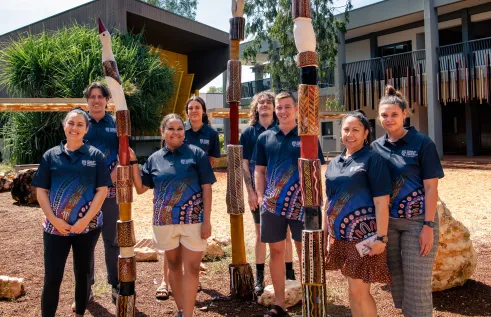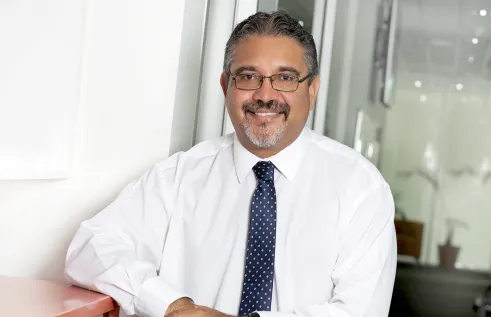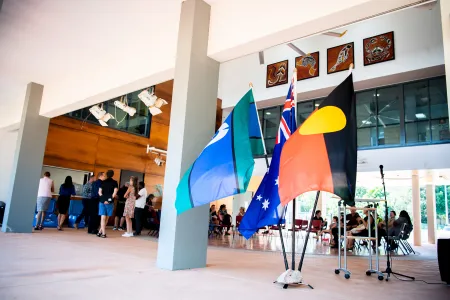News
Research recommends ways to strengthen the Indigenous mental health workforce
New research by Charles Darwin University (CDU) scholars suggests a strengthened Indigenous mental health workforce could effectively improve mental health outcomes for Aboriginal and Torres Strait Islander people.
The report, written by Prof Dominic Upton, Assoc Prof Linda Ford, Prof Ruth Wallace, Sarah Jackson, Jenna Richard from CDU and Dr Penney Upton from the University of Canberra, finds that an Aboriginal and Torres Strait Islander led mental health workforce would promote self-determination and increase the reach of mental health services by providing culturally competent services.
The Aboriginal and Torres Strait Islander population experiences high rates of psychological distress and high suicide rates, yet engagement with mental health services is low.
Professor Dominic Upton, Dean of the College of Health and Human Sciences at CDU, said that often Aboriginal and Torres Strait Islander people did not receive the care they needed until they were acutely unwell.
The researchers found a key barrier to service engagement was an under-representation of Aboriginal and Torres Strait Islander people in the mental health workforce.
“We found that one reason for this under-representation is that burnout and organisational factors reduce staff retention. High non-completion rates for Aboriginal and Torres Strait Islander students studying mental health courses also means there are not enough clinically qualified Aboriginal and Torres Strait Islander staff to recruit,” Professor Upton said.
Mental health services delivered by Aboriginal and Torres Strait Islander professionals are considered more culturally safe and trustworthy.
Providing better professional development training opportunities for the existing Indigenous workforce and ensuring all non-Indigenous staff are culturally competent can increase the cultural safety of mental health services.
The researchers highlight that addressing systemic racism and recognising and valuing the strengths and expertise of Aboriginal and Torres Strait Islander mental health workers will also improve retention.
Professor Upton stressed that providing mentorship, networking and increasing the support available to Aboriginal and Torres Strait Islander students studying a mental health qualification were other important ways to address this issue and that this was a key focus of program development at CDU.
“We are also striving to embed cultural competence and trauma-informed practice into our health practitioner training here at CDU. We see this as fundamental for improving working practices and mental health outcomes as it places knowledge and understanding of cultural factors at the front and centre of professional training, rather than treating it as an add-on or optional specialisation,” Professor Upton said.
The report resulted from a collaboration between CDU’s College of Health and Human Sciences and College of Indigenous Futures, Education and Arts along with the University of Canberra. It is one of six papers published as part of Australian Institute of Health and Welfare (AIHW)’s new Indigenous Mental Health and Suicide Prevention Clearinghouse today.
For more information, visit www.indigenousmhspc.gov.au
Charles Darwin University is actively seeking Higher Degree by Research students to take part in research projects like this. Scholarships are available. Learn more here.
Related Articles

CDU students ready to make their mark at Indigenous Nationals games
For the second year ever, a team of 14 talented and athletic Charles Darwin University (CDU) students will compete at the upcoming Indigenous Nationals games, set to take place in Melbourne next week.
Read more about CDU students ready to make their mark at Indigenous Nationals games
CDU student paramedics tested in a simulated explosion
Charles Darwin University (CDU) paramedic students were put through their paces in a real-life scenario that included the sights and sounds they would expect while responding to emergencies.
Read more about CDU student paramedics tested in a simulated explosion
CDU joins celebration of the Barunga Statement’s 35th Anniversary at annual festival
The historic Barunga Statement, a pivotal moment in the journey towards First Nations rights in Australia, commemorates its 35th anniversary this year at the annual Barunga festival.
Read more about CDU joins celebration of the Barunga Statement’s 35th Anniversary at annual festival
